10 Signs of an Unhealthy INFJ
The INFJ is one of the most misunderstood personality types in the Myers-Briggs community. They are often touted as wizards or berated as “snowflakes”. So many people mistype as INFJs that a lot of mixed-up information has been developed as a result.
When you read a type description of an INFJ, chances are you’re reading about a very well-developed, mature, never-in-a-bad-mood INFJ. If you’re trying to find your personality type and you’re only reading examples of extremely evolved INFJs, it might be confusing if you’re at a different place in your development. I for one am not always perfect and healthy. I don’t constantly come up with profound insights and react with grace to everyone in my environment. If you are like that 100% of the time, then I applaud you! And I also want to know your secrets 😉
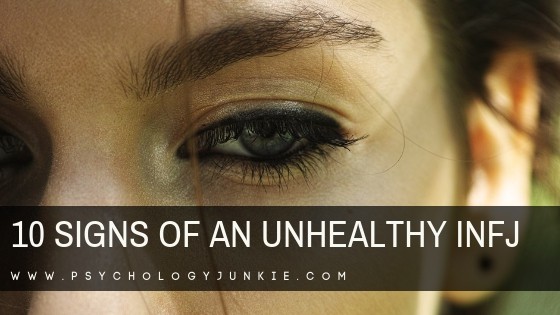
Today we’re going to talk about unhealthy INFJs. INFJs can become unhealthy for a variety of reasons: stress, an environment that doesn’t nurture their needs, or overuse or repression of specific mental processes. All INFJs go through phases where they are unhealthy (nobody’s perfect!), but knowing the warning signs can help you avoid some of these bad behaviors!
Because the reasons INFJs become unhealthy are so varied, it’s unlikely that you will relate to all 10 of these issues. Some of these habits result from stress, some from poor self-esteem, and some from inflated self-esteem!
Disclaimer: I LOVE INFJs – this article is not meant to shame INFJs or to bash them. Each type has different ways they can react to being unhealthy or immature and each type has strengths and unique capabilities.
10 Signs of an Unhealthy INFJ
Not sure what your personality type is? Take our new personality questionnaire here. Or you can take the official MBTI® here.
#1 – They try to keep other people happy, but they resent them as a result.
Both healthy and unhealthy INFJs desperately want harmony in their environment. They like to meet people’s needs and make sure the people around them are happy. We feed off of happiness and harmony. It’s hard for us to relax without it! But healthy INFJs know when to say no, and they don’t begrudge people the favors they do for them. Unhealthy INFJs have a tough time saying no, and they harbor bitterness towards the people they are helping. They keep a mental checklist of all the things that they’ve done for others and compare how little is done for them in return.
#2 – They leave arguments instead of hearing other people’s perspectives
Unhealthy INFJs are very attached to their subjective viewpoint and can become quite stubborn about their opinion. Instead of having a friendly debate where both sides are heard respectfully, they tend to state their opinion and then leave. This gives their opponent no opportunity to state their case. This tends to happen when INFJs repress their auxiliary function, Extraverted Feeling or don’t develop their dominant or tertiary function (intuition or thinking) in positive ways.
Healthy INFJs are all about perspectives. They LOVE to hear other people’s perspectives and empathize with other people’s points of view. They don’t mind a challenge or a new way of looking at things, in fact, it excites them!
#3 – They can be over-sensitive and self-absorbed
Unhealthy INFJs have a hard time not taking everything personally. They view any form of criticism as a personal attack and can quickly create a “me versus the world” scenario in their mind. They “door slam” too easily, and they may take on the role of “misunderstood misfit” as a way of coping with their isolation.
P.S. Lots of types can become over-sensitive and self-absorbed, this is definitely not exclusive to INFJs!
#4 – They are hyper-sensitive to the body language and comments of others
Unhealthy INFJs tend to become paranoid about what other people are thinking of them. They can misinterpret body language or harmless comments into signs that others dislike them or hate them. They crave a lot of reassurance and validation from the ones they love. On the flip-side, they can also become reclusive because they experience so much stress trying to decode other people’s intentions.
Why does this happen? In my experience, I’ve seen this most frequently with INFJs who haven’t had a lot of positive affirmation in their life. Many INFJs have experienced growing up in environments where they were misunderstood or their strengths were viewed as weaknesses. Once INFJs own their strengths (and accept their weaknesses for what they are) they can experience more personal confidence and growth and less insecurity.
#5 – They have zero tolerance for conflict
INFJs hate conflict, even if they are healthy. However, healthy INFJs take the time to hear every perspective. They realize that respectful conflict can promote growth. Unhealthy INFJs either leave conflict directly or insist that other people “make up” as quickly as possible. This is because INFJs tend to absorb the feelings of the people they are with, which means if there is anger or frustration in the environment they feel stressed or frustrated. In an effort to feel better themselves, INFJs may try to take control of the conflict situation and end it prematurely.
#6 – They are reclusive and avoid attachments and responsibilities
As introverts, INFJs naturally re-charge by getting time alone. However, some INFJs take this too far and completely isolate themselves from others. They get wrapped up in analysis but they don’t bring their ideas out into the open. INFJs need to harness their extraverted functions, feeling and sensing, in order to make their ideas and insights usable in the real world. It’s important for INFJs to balance regular alone time with activity in the outside world. Getting feedback from friends and engaging in new experiences inspires them and gives them new ways to bring their ideas to fruition.
#7 – They struggle with regular binge-eating, over-exercising, or impulsive behaviors
INFJs who are experiencing a “grip” stress reaction can become abnormally focused on indulgent sensory experiences. If you have been experiencing chronic or extreme stress for a long time you might find yourself wanting to throw caution to the wind and eat everything in your pantry, organize your possessions obsessively, or spend all day in bed binge-watching Netflix. If you find yourself doing this repeatedly, try to see where the stress is in your life and find some ways to de-stress.
#8 – They see themselves as more enlightened than others
Some unhealthy INFJs can become pretentious because they feel so different from other people. They can get stuck thinking that they are better or more valuable than other types. They might see sensing types as narrow-minded, thinking types as cold, or perceivers as lazy. Pay attention to your thoughts. If you’re giving the people around you one-dimensional descriptors or labels then you might be in an unhealthy state. Healthy INFJs are able to appreciate the differences in each individual and admire both their strengths and the strengths of others.
#9 – They are incurably perfectionistic
INFJs tend to be perfectionists, but unhealthy INFJs take this to a whole new level and feel trapped in a cycle of self-criticism and unattainable high-standards. They re-read every text, email, or letter they send multiple times. They are terrified to share their ideas for fear of rejection. They have an inner-critic that chastises every decision they make. They burn themselves out trying to be perfect so that they can be above reproach and invulnerable to criticism. You can find out more about the INFJ perfectionist here.
#10 – They forget that they matter
Many INFJs go through phases where they feel so responsible for other people’s emotions that they steamroll over their own needs and desires in the process. It’s hard for them to stand up for what they want sometimes because they’re so afraid of saying “no” or being seen as selfish. It’s important for INFJs to remember that they matter, and that their desires and needs have to be included in their priorities. Personality Hacker has a great article about this here.
What Are Your Thoughts?
Do you have any input for INFJs who are in an unhealthy phase of their life? Let us know in the comments! If you’d like to know more about the INFJ personality type, be sure to check out my eBook here!
Other Articles You Might Enjoy:
10 Things That Excite the INFJ Personality Type
24 Revealing Quotes About the INFJ Personality Type
7 Things that INFJs Experience As Children
3 Weird and Wonderful Secrets About the INFJ Personality Type


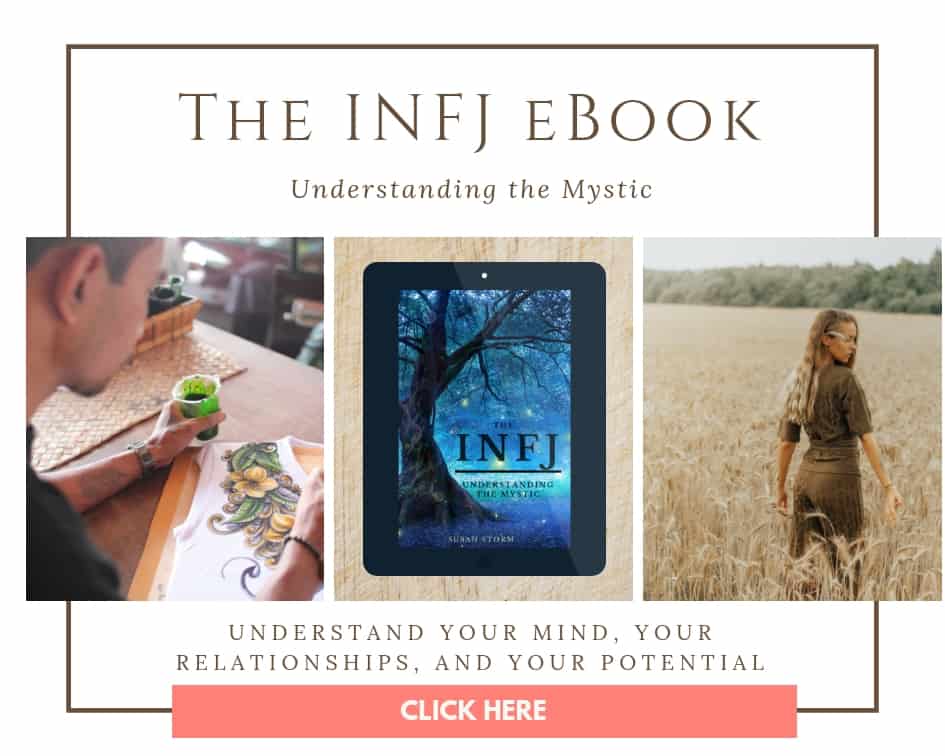
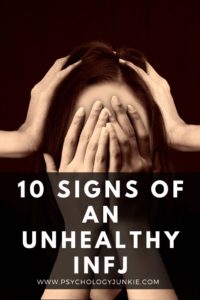
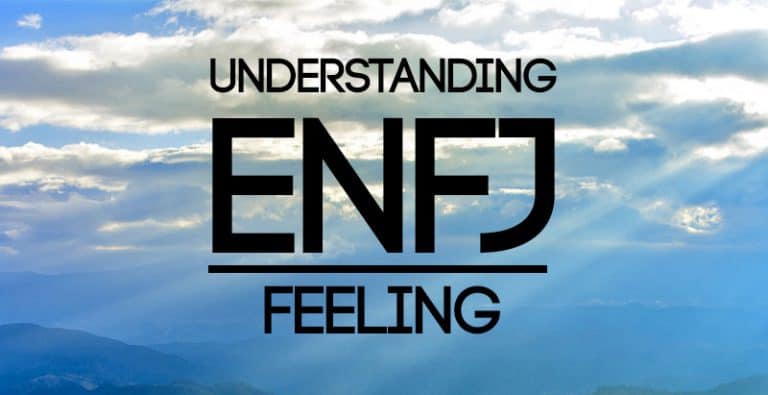
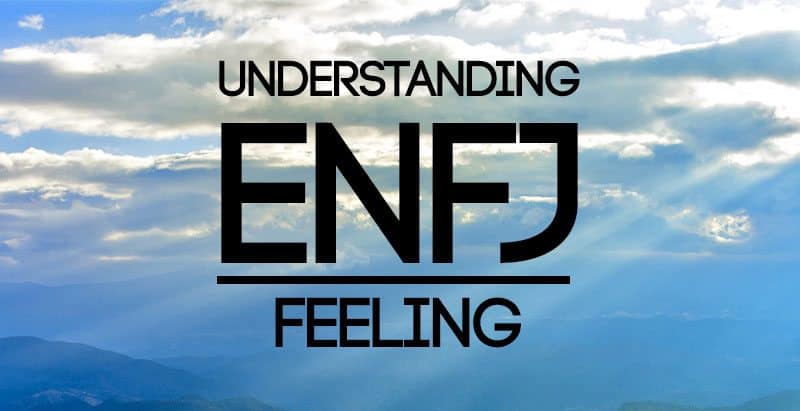

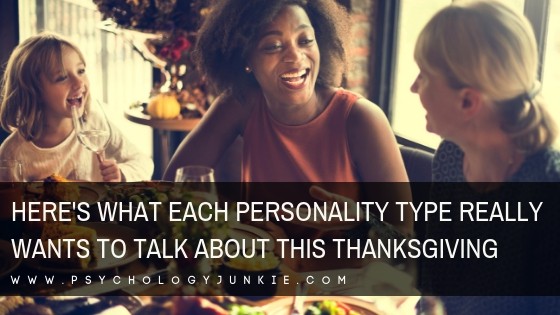


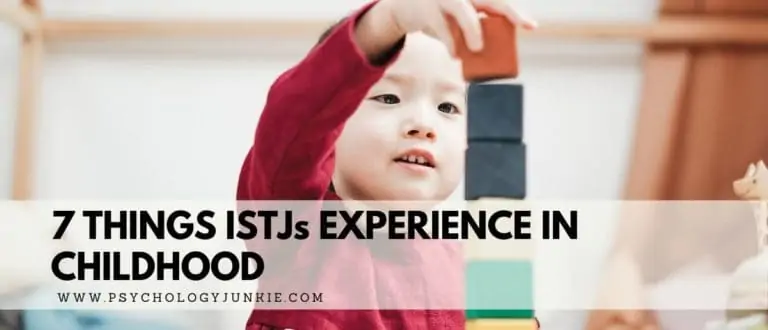
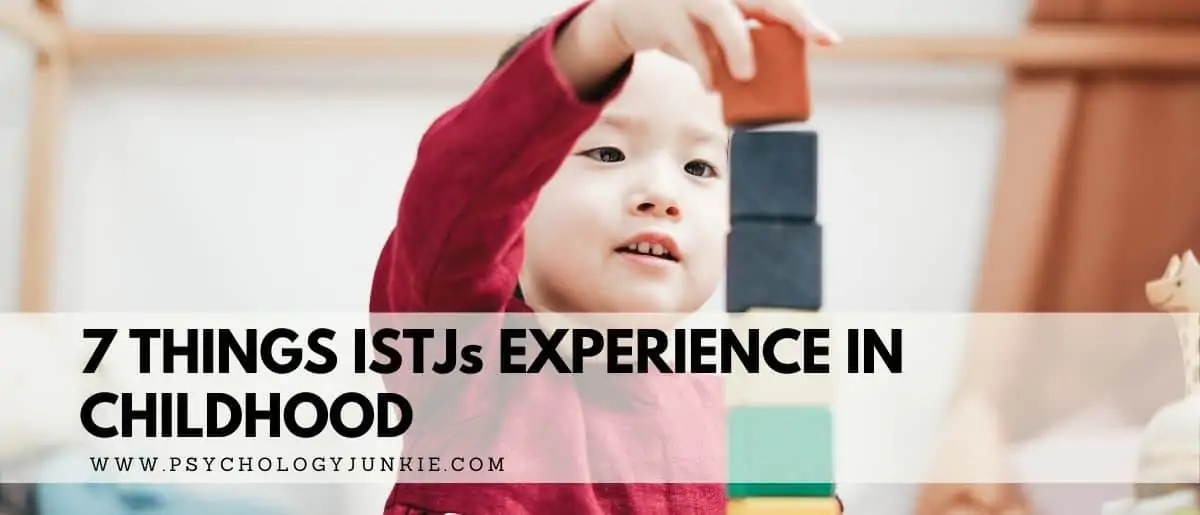
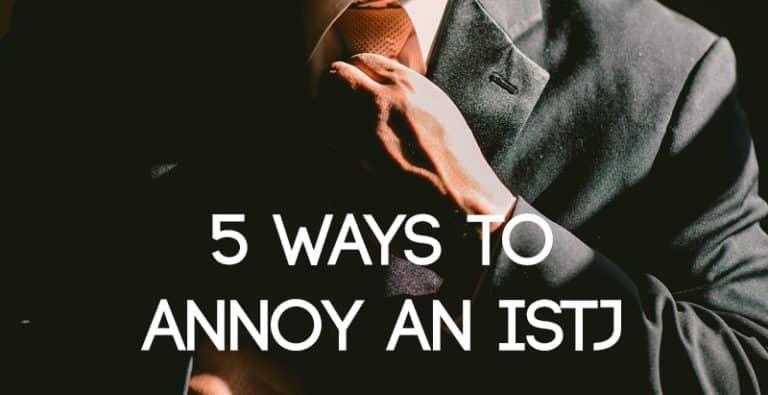
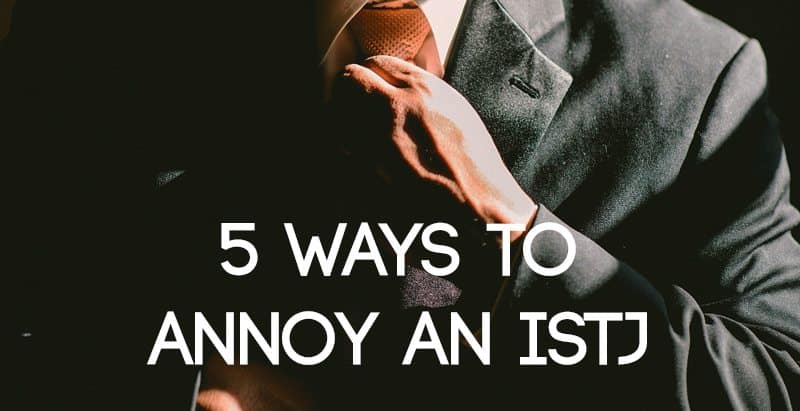
I definitely relate to many of these! At this point in my life, though, I definitely see myself struggling with #3, #5, and #6. #7 definitely hits home in some ways, though. Within the last six months, I have become increasingly sensitive to too much social stimulation, and even will get a slight stomach ache if I feel that anyone is upset with me for any reason. I’ve also found myself unmotivated at times and I shy away from literally anything that could cause stress. The minute I get home, I like to be reclusive and just read a book or watch a TV show (#7). I don’t have a lot of negative things in my life, but I almost feel as though the smallest thing is going to tip me over. If you have any advice to deal with struggling with #3, #5, #6, and/or #7, I would really appreciate it. I’m graduating from college in May and a part of me looks in on my life as if in an omnicient POV and sees myself as doing fine; I still get homework done and go to work and socialize with family, but deep down I feel this struggle that keeps me from WANTING to do anything. I always read stuff about INFJs being so selfless, but I feel almost selfish because I put my own introverted self ahead of others a lot of the time, which makes me feel like some sort of defective INFJ ? Anyway, I hope that all makes sense. I really enjoyed the article, but like I mentioned, any advice is helpful ?
As someone who lives with two INFJs i personally see points 2,3,4,6 and 8 frequently. I do not live with healthy INFJS but I’m learning what I can to help them. They feed off my energy a lot. It’s fairly draining and I have pulled back a lot over the years and I think it’s been really damaging. Time to fix things and move forward.
Yeah I go through some of these bad phases it’s creepy how accurate this is.
Hello,
thanks for this brief list of informative signs. It address something I have been concerned with about myself. I am probably extremely reclusive. I have recently left a business partnership with someone who is very demanding, chaotic, and occasionally explosive. In order to deal with this I used a lot of cloaking, like playing possum,’ be very still until the danger passes’. Addressing my needs with her was often pointless.
After reading more about my type and spending the last few months working at home for myself I realized how much about my situation was causing me extreme stress, but I couldn’t allow myself to see it and still do that work. I shut off feelings mostly. Also I come from a big family with a father who is bipolar and whose energy signature is not unlike that of my ex-business partner. My mother died in 2017 and there was a lot of fighting amongst my many siblings. I felt as if it was my job to be steady in the storm, which also seemed to mean ignoring my own feelings of grief etc.
I think I’m quite stuck as a result. Being alone is so comforting after so many years dealing with poeople like this, but I know that I am not sharing my gifts with the world when I never go out or interact except with a very small circle of people. I am aware that I have much value to share with others and a unique perspective, lots of creativity. I’m starting a new business now so I am stretching myself somewhat, but I still feel as if I’m letting myself and others down. I am very reluctant to take on ANY more responsibility than I have already. I can’t decide whether I deserve a break, or whether I need to hurry and make up for lost time.
Thanks for this.
It highlights an issue I have. I’m an INFJ and I come from a very big chaotic family headed by a controlling bipolar father. Until a few months ago I was ,for 9 years, business partners with a demanding, chaotic, sometimes explosive woman, not unlike my dad in her energy signature. Working with her was pretty much introvert hell ( I finally understood that after reading more about introverts and INFJ since I’ve been at home these past few months). Last year my mom died and in the aftermath there was a tons of fighting amongst my many siblings- I felt it was my duty to be the steady unemotional one.
As a result I believe that I have neglected my feelings badly because others always come first. With my dad and my business partner I played possum mostly ‘ be very still until the danger passes’. With both of them, attempting to address my needs was totally fruitless. With siblings and other family I reckon they think i don’t need anyone to listen to me.
My point is that I’m now VERY VERY reclusive. I’m at home since leaving the partnership, starting my own small business again, and I don’t want any more responsibility than is absolutely necessary. I hardly ever go out and I’m reluctant to socialize. I find other people really tiring. I feel as if something is always expected of me.
I can’t decide whether I deserve a break after all these years of other people’s drama, or whether I’m wasting time when I should be pushing myself to be a better person. I know that I have creativity and gifts to share, which I won’t share if I’m holed up at my house for the next decade.
Yep. Yep. Yep and Yep !
Thank you for this article. My husband is an INFJ with narcolepsy. I’m an ESTP. We have a 2 yr-old and a 9 month-old. I read this and knew he struggled with some. I sent it to him and he told me he regularly experiences 9 out of the 10 you listed here. So thank you. We’re reaching out for some help. I’m no therapist and I’ve been a bit of a fool to act like his – of all people.
I agree with this a lot. A few of them I dont have but many of them I do.
I keep finding myself relating to INFJ articles like this — a lot of it has to do with Extraverted Feeling as well as your enneagram type. (Though certainly INFJs are more predisposed to some of these types than others!*)
For example, my enneagram tritype is 592:
• Fives would be the ‘withdraw and keep everything in your head’ reclusive/avoidant aspect
• Nines would be the ‘suppressing your own feelings for the good of everyone else/putting others first all the time’ to avoid conflict/promote harmony aspect
• Twos would be the giving nature that can end up feeling taken advantage of, as it keeps score and ends up resentful when others don’t give as much (or even a fraction as much) as you do
(and then if you want to get into enneagram ‘wings’, both Two and Nine have a ‘One’ wing — looks like “2w1” or “9w1” — with the ‘perfectionist’ aspect! ;D)
So I would just like to recommend that anyone who encounters difficulties like these invests in researching the enneagram system; it measures levels of health and can provide direction with better awareness.
* (I am actually an INTP, which I know is unusual for this combination… I have a lot of issues -_-;)
Very great article! I find it very true. I am glad that you explored INFJ from this angle. Great article!
Thank you! I’m really glad you enjoyed it! 🙂
Wow! This is awesome. Every possible aspect has been introspected that it nearly cracked my nutshell open for the world to see. Feeling is different from seeing everything we feel written in words. Kudos!
Wow…this is all 100% me! And I am definitely not going in a good direction at the moment, how do I get out of this cycle?
So totally me….nice to see the things I find hard to understand about myself put in writing. Nice to know I’m not the only one and these traits have led me down more than one dark path in my life. The reasons I am in a such a bad situation at present is due to all of the above. I find I am constantly misunderstood by other people. People often say I’m odd, strange or a freak. Doesn’t bother me really, as I look at who’s doing the accusing! I look at the world and see all the oddballs it contains, all the most dreadful and sometimes wonderful things they do, and I think, so this is normal? Thank goodness I’m a freak. Don’t really want to be like everyone else. Susan, your articles are awesome, thank you so much for your insight and understanding and for sharing. Many a time it’s been a light in my dark place. Keep up the great work.
I am an infj. But I actually thrive in conflict. I’ve always been that way. Even as a child I never backed down whether the conflict was a verbal or physical confrontation.
I found article helpful. I am a stressed out INFJ!
This is accurate 100%
Thank you so much for the article
I strongly believe that INFJs are no-lifers, especially when all they want to do is stay alone and not associate themselves with others. It’s fine to have your alone time to think and recharge, but we as humans were also created to bond together with one another . We all, (every personality type), need both human contact and alone time. 50/50 is a good balance.
None of you stressed out INFJs are alone. I am going through it too right. I feel like I need some type of therapy to help me back on track (& a vacation…about a week…from people). Need to get caught uo with some tasks, relax & de-stress, do something creative & take greater control of the things that really matter in life…in a good way.
Ok. That’s me.
4, 9, and 10 for me. If I try to summarize why I’ll start ranting so I think I’ll keep it in my head.
Howndo we correct it?
First of all, it was really necessary to highlight (like you did) that we most often than not, are reading about evolved INFJs : hence the confusion.
I go through phases of unhealthy behaviour and thinking, but if I were to sum up which of these 10 I have been able to relate to? i’d say ALL OF THEM. While not at the same time, but if I’m not relating to one, i’m most likely relating to the other.
Very decent read and very on point 🙂
Wow. Apparently, I’m a VERY unhealthy INFJ. In my defense, I’m stuck in a very toxic work environment. I am heavily experiencing every item except for #10. Is there a way to correct these? I funny want to see a therapist bc every time I’ve seen one they don’t do anything but talk with you about irrelevant things. Honestly, I’d rather do it myself anyway, as I know myself better than anyone else. Can you recommend any books or articles?
Thank you for writing this. It is quite difficult to find content about INFJ’s that delves more into our issues or unhealthy behaviors, and why they’re happening. It was something of a relief to read this because I’ve been doubting myself lately as an INFJ, wondering why I’m acting so unlike these descriptions of evolved INFJ’s. And unfortunately, I can relate with all of these behaviors… so I understand now, and I want to fix it. You’re right that we all go through phases of this sort of behavior, its not constant, but how can we help ourselves get out of these unhealthy patterns? Can you reccommend any articles or content that offer ways to help an unhealthy INFJ break these behaviors?
yea, i’ve been everyone of the 10 at some point in my life…..
This is where I am. I want to know what to do to change things around. Any thoughts?
Was there any advice on your query? My partner is all 10 of these and unfortunately it’s stopping us from having a deeper connection…
10/10, all of these unhealthy signs are on me now. Hahahahahahaha :”)
You’re an amazing person Susan! I resonate with almost all 10 of these.
I freely admit to being an unhealthy INFJ. I’ve stifled Ni growing up, developed Ti as my main function behind Fe, as my auxiliary function. Se stays my tertiary while Ni becomes my inferior function. I have all the right cognitive functions in the correct order but with a different starting place: Fe:Ti:Se:Ni
To repair the damage I must shift Ni back to becoming my dominant function. Then grow Fe as my auxiliary with a fully developed Ti as my very strong tertiary function to back it all up. Se is still lucky last & I still have no pleasure staying there…. Yet.
A thought provoking article. Very good Susan!
Just going to leave this here, the results from your own website so that unable to prove I am not mistyped.
You are the INFJ “Mystic”
Result Image
As the Mystic personality type, you are wired to notice the future implications of the things happening around you. You tend to have deep insight into people and situations. This is because rather than seeing what’s on the surface, you look for the underlying reasons why people do what they do. You’re someone who reads-between-the-lines, notices patterns, and picks up on symbolic meaning.You are also deeply concerned with how your choices will impact other people. You care about harmony, maintaining morale, and improving the emotions of the people around you. This tends to make you skilled in the art of counseling.
Your Strengths Include:
– Ability to sense the underlying reasons for things.
– Foresight into future implications and effects.
– Empathy for the emotional states of others.
– Strategic planning abilities.
Find Out More About Your Type!
SHARE YOUR RESULTS
Oof. Deeply in all of these and tough to be called out. Only just learned about the Ni-Ti loop this morning so I am going to try and integrate more extroverted sensing into my life. Thank you for this article. I have been trying to figure out (Ti) if my actions in recent conflicts have been justified (I door slammed) and it’s helpful to remember that this part of me represses the side of me that is open and compassionate to others feelings. I’ve been feeling so stressed out and sensitive because I’ve been on the Fi-Ti loop for years and it’s just made it all get worse and worse – no progress in my visions, going nowhere in life, isolating myself. I’m just so overwhelmed that I can’t handle any criticism anyone says to me unless it’s said gently. Pretty much lately I’ve been feeling like if someone’s not coming to hug me they can get out of my life. 🙁
Thank you for this! I’ve been see-sawing between average and unhealthy for a very long time. I do retain the memory of being “healthy” and I am working on finding my way back to that place. This article has helped me differentiate between healthy modes of self-isolating, judgemental, door slamming behaviour and downright reclusive and harsh behaviour which I’ve defended as being ” just my personality type” but knowing deep inside that it’s not. This article validates my deepest feelings of unease relating to my unhealthy behaviour. xx
Very good article. One of my biggest mistakes is that i’ve tried to establish rapport with too much people, mimicking their body language, tonality, following their expectations and focusing more on their point of view rather than stating my real opinion in order to avoid conflict and believing that they will change if they are seeing that I can be like them.
Also is very unhealthy when you stay too much in your head, overplanning stuff and not paying attention to details. We must remember that we can’t force people to change and please them all the time.
Socrate once said that the hardest battle is with ourselves.
Voltaire said that, not Socrate.
I’ve seen myself on many sides of the spectrum, but with age I have grown to be a mostly healthy INFJ. At my best, I sometimes behave more like an ISFP (when I cultivate my artistic tendencies), although my default is and surely always will be INFJ. At my worst, I cultivated a very long-time “best friendship” with a Narcissist; so, I think my most important life advice for any unhealthy INFJ is to please be mindful of who you keep in your life (and perhaps even more importantly, in your thoughts)
Excellent analysis, as usual. Re point #1, the resentfulness comes when I don’t get any sense of being appreciated and notice it to be the trend. A gesture as simple as an appreciative glance is more than sufficient for me and makes my day!
At 56 years old, I have only recently stumbled upon this INFJ thing.
My relationships struggle because I more often see people with malicious intent and I am completely guarded to not feel the pains I have experienced through the years. I believe the door slam is necessary because otherwise you’re literally wasting precious time on this earth with people that work against who you are. I believe I do it as a matter of efficiency and to be least emotionally distressed. But each day I’m learning more about this personality type and seeking professional help in all those things could change. Until then I will stay in this washing machine of thoughts trying to get a hold on this personality and my relationships.
Godspeed!
Best article ever! A follow up of how to grow would be great. Have you written something like that?
I know I have some articles for INFJs on personal growth, but not specifically relating to this article so that’s a good idea!! I’m writing it down! Thank you 🙂
As an INFJ, I agree and I appreciate the mirror!
Can you please finish these? ISFJ (my type) is missing.
Hi Star! I actually had an ISFJ friend of mine write the ISFJ one 🙂 It’s right here: https://www.psychologyjunkie.com/confessions-of-an-unhealthy-isfj/